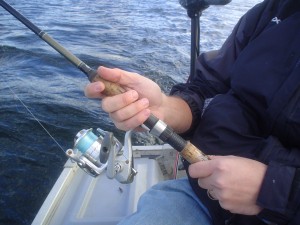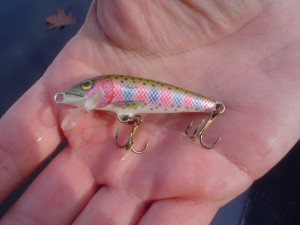- Have Patience
Probably the best advice you could get when it comes to fishing would be to have patience. This advice is probably best suited for the novice to intermediate level fisherman as they seem to be the most impatient. I once knew of an older fisherman who would not feel he “put his time in” until he spent at least 6 hours on the water. Have you ever seen a small child go fishing for the first time. Generally the first thing you hear after the “plop” of the dobber in the water is “Do I have one yet?”. Fishing is just as much about self control as it is about catching fish. I generally will stick with a location for at least 30 minutes before I decide to move on to another spot. This also gives you an opportunity to pay attention and list to your surroundings which is another tip I will talk about later. If you are constantly moving around and playing with your line you will scare away any potential fish. It may sound stupid but, you can only catch fish when your hook is in the water.
- Be Prepared
Almost as important as having patience is being prepared. If you have to leave a good fishing hole because you forgot your lunch you will drastically lesson your odds. Some important items to bring on your excursion would be a bagged lunch, all your necessary tackle that you will need, sun block, the proper dress for the day. Generally the more comfortable you are the longer you will stay fishing. If you are baking in the sun and are dreaming about a cheeseburger because you missed breakfast you length of stay will most likely be shortened. A first aid kit is always handy in emergencies as well.
- Location, Location, Location
Just as in business location is everything. Who wants to fish where there are no fish. Pay attention to the veteran fisherman, they will most likely not share their spots with you but you can be crafty as to find out where they are heading. Understanding the species of fish is key to determine where they like to hang out. Here are a few pointers for freshwater fish. Bass generally like cover to ambush their prey. Head towards the Lilly pads, overhanging branches, tall grass and anything else that can act as a hide out. Trout like either running water, but can be caught in slower moving water as well. Look for eddies around rocks or other debris. Sunfish, honestly they are everywhere, but near the shore is sometimes better than deeper water. Pike also prefer running water, but will ambush their prey like bass, so they can be found in cover as well. On the saltwater look for Rips formed by running water if you are pursuing bass. Look for working birds if you are seeking bluefish. Sandy bottom for flounder and rocks for Toutage. The key truly is however study your fish that you are pursuing. Understand there habits and ask the locals.
- Pay Attention
Get in tune with your surroundings. Be quite and sit still for a long time. Really understand what is going on all around you. One of the reasons why I love fishing so much is that if you really want to catch fish it forces you to get in tune with nature. Some things to pay attention to are any birds that are diving in the water and find out what they are after. Look for splashes in the water. Listen for frogs if you are pursuing bass. If you see many splashes on the top of the water make sure you are using surface plugs or flies. These little subtle clues will help you get closer to the fish. A good fish finder is no match for the human mind. Really engage your mind and senses to really hone in on where they fish are and what they are feeding on. Fishing can be just as much a spiritual experience as it can be a recreational activity. Pay attention to weather and environmental conditions as well. Keep a record of what the tide, moon phase, time and sky conditions were when you are catching fish so you can plan for these factors the next time you head out.
- Research
Understand and respect your prey. Fish are not stupid, mindless eating machines. Almost all species are very cautious about what they eat. Understand how they think and what there habits are. Find a good book on the fish you are after. I recommend some of the Fishing E-books we are selling. Also when you take the time to really study your fish it makes it that much more exciting when you catch one in person.
- Shhhhhh, Be Quite!
One thing I can’t stand especially on a quite pond or lake is a noisy fisherman. I remember one opening morning I was fishing out of my Jon boat and two guys pulled up in their tin boat right beside me. It was bad enough that they parked so close to me but they were constantly dropping tackle and other heavy items on the bottom of their 12 foot fish repelling device. I can only imagine what it must have sounded like under the water. Needless to say I did not catch many fish that day. Fish are very in tune with sounds and can even hear the wiggling of a night-crawler at the end of a line or so I have been told. I make it a point not to talk loudly or make any unnecessary noise when I am on the pursuit.
- Enjoy Your Experience
If you are having a good time, you are going to spend more time fishing. The more time you are fishing the more fish you are going to catch. It is as simple as that. Invest in a comfortable fishing chair if you are serious about catching fish. They sell a nice cloth chair that can fit nicely in an over the shoulder bag for less than $20. Get relaxed, but not that relaxed. Some people associate fishing with beer. In some ways this makes sense, but in others it does not. It is important to be relaxed but you also need to be on top of your game and mentally aware of everything that is going on around you. If you are oblivious to obvious clues around you then you are not doing yourself any favors.
- Use the Right Bait
Part of understanding your prey is understanding what they are feeding on. If you are fishing for Carp and you are using shiners you wont be eating Carp for dinner (I would not recommend eating Carp either way as I would not think it tastes particularly good). I always prefer live bait over artificial, however there is much debate over what is the better method. It all really depends on the fisherman, but it is important to use or mimic whatever the fish are feeding on.
- Switch Up Your Colors
I once participated in a fishing tournament and was talking with someone at the end of the evening about what they were using for bait. They were using a red rooster tail where I was using a yellow rooster tail. We both fished in practically the same locations all day, but when it came time to weigh in our trophies he had about double the catch that I landed that day. It pays to switch up your colors regularly to determine what they fish are preferring for a particular day.
These is an excellent article about using the right color lure found on this site.
- Increase Your Bait Size
I know this tip kind of sounds like a spam e-mail, but really it helps to catch larger fish. I have found when catching striped bass that when the bite starts getting good to increase the size of the artificial lure I am using as it generally lands larger fish. The smaller fish are less apt to try to tackle a larger prey which leaves it untouched for the larger fish to jump on the line. I often use Bluegill or Crappie when I know that thier are larger prey around like Pike or Muskie. Here are some Crappie Fishing Tips that will help you save some time at the bait shop. This technique has helped me catch larger fish in both freshwater and saltwater. You may catch less fish, but the ones you do catch are worth keeping.
I hope these ten tips help you catch more fish. Feel free to leave comments below on any of these tips as I am always eager to hear feedback. Best of luck and tight lines.


Thanks for the tips. I am a beginner fisherman with my two teenage sons. If fishing for bass near lilly pads is best, how do you prevent your line from getting hung up on the lilly pads? What do bass like to eat?